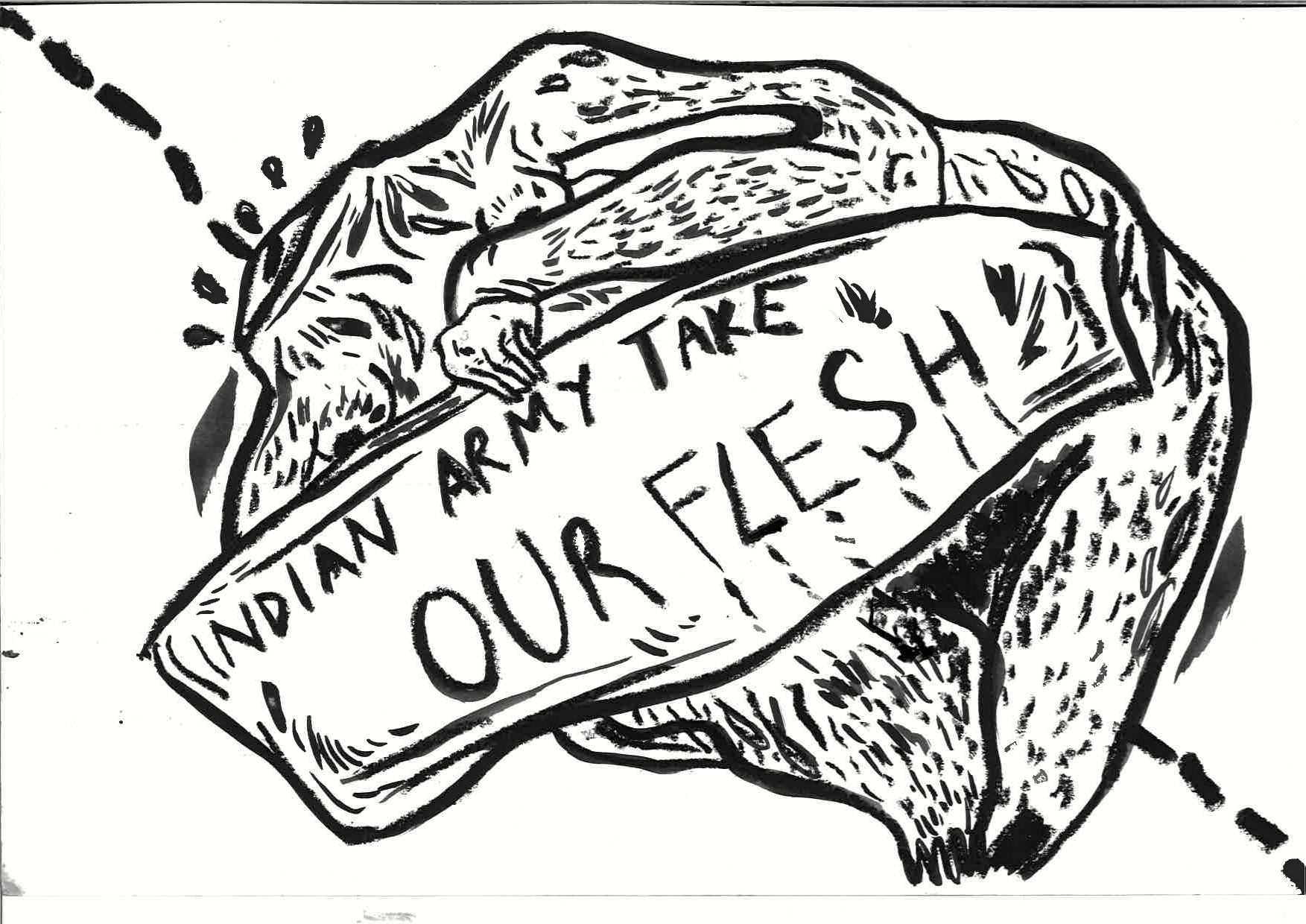
On 15 July 2004, 12 elderly and middle-aged women stripped naked in front of the Kangla Fort unit of the 17th Assam Rifles Unit of the Indian military in Manipur, India. The women held banners across their naked bodies which read: “Indian Army Rape Us”, and “Indian Army Take Away Our Flesh”. The protest was formed in response to the abduction, brutal rape, torture, and murder of Thangjam Manorama, a 30-year-old woman who was falsely accused by the Indian army of being a militant. Those guilty of this horrific act were never exposed, with the 17th Assam Rifles claiming her execution was permitted under the Armed Forces Special Powers Act (AFSPA).
Accusations and justifications like these are all too common in Manipur, a state in North East India, which borders with Myanmar. The AFSPA was actually introduced by the British in 1942 in response to the anti-colonial Quit India Movement. The subsequent Partition of India in 1947 left the majority princely states with an undecided future; thus, Manipur only became part of the Indian Union in 1972.
In 1958, the boycott of the general election, and later an extended boycott of government officials and schools led to public disorder and increased fighting with rebels in Nagaland. The regional conflict intensified to an insurgency, which was responded to by the Indian government with the deployment of the 17th Assam Rifles paramilitary unit. AFSPA grants the government “special powers”, which include shooting to kill, to arrest, and stop and search without a warrant, as well as legal immunity to army officers. Child soldiers are also widely forcibly recruited to various militant groups within the region.
“The government is demonstrating its power over women’s bodies and thus disregarding women’s own autonomy”
The consequences of the AFSPA has meant violence, deaths, and rape are continually perpetuated by the army of the Indian government with no consequences or justice to the victims or their families. Human Rights Watch criticises it as a “tool of state abuse, oppression, and discrimination”. The 2004 protest shows the relevance of the brutal killing of Thangjam Manorama within the wider violence perpetrated by the AFSPA. Through the continued acts of brutality that are committed by the AFSPA, the government is demonstrating its own power over women’s bodies and thus disregarding women’s own autonomy.
The act of stripping in protest brings into question the wider politicisation of women’s bodies in South Asia. The female body is held as accountable for the nation, which is notable through nationalist images such as ‘Mother India’, which also encompasses the role of women in everyday society – to exist largely and solely for the family. After some members of the Meira Paibi (women torchbearers: the largest grassroots and women’s social movement in Manipur) saw the deeply upsetting and disturbing mutilated body of Manorama, they decided something radical with a lasting impact had to happen. Protests, marches, hunger strikes, and other vigilante activities were not being met with success. Elder women’s choice to centre themselves in this protest was deliberate.
“To violate elderly naked women would mean to openly admit that the Assam Rifles were not there to protect Manipuris”
The intersections of honour and age meant the Assam Rifles were put in a situation in which structural sexism was turned against them – to violate these elderly naked women would mean to openly admit that the Assam Rifles were not there to protect Manipuris. Whilst screaming for the military to rape the women and “take away their flesh”, Gyaneswari (a participator) recalls the activists “demanded them [the Assam Rifles] to tell us what they were stationed here for: to protect our people or to rape our women?”
The women used their bodies as weapons. Aware of the inevitable humiliation that an audience would attempt to reinforce in response to their actions, the women acted in solidarity with each other in order to amplify the cause of the people of Manipur. Before the age of social media outlets, the women’s action still had an international impact: the photos of their protest still live on and have an undeniable impact on those who see them.
Women’s social movements are weaved into Manipur’s history. The Women’s War and Women’s Uprising were significant anti-colonial struggles headed by women. Similarly, today, The Meira Paibi and Nisha Bandi movements are at the forefront of activism seeking to tackle alcoholism, drug abuse, violence against women, and human rights violations. Many believe the Mother’s Market in Imphal (a bazaar run entirely by women) is symbolic of the matriarchal society Manipur represents. The world’s longest hunger striker Irom Chanu Sharmila, a Manipuri woman, began a 16-year hunger strike in 2000 against the AFSPA.
“The West is unable to claim their hand in facilitating the revolution of these women”
The current situation in Manipur is given limited coverage in India, and even less in Western media, with the Indian government refusing to acknowledge the use of child soldiers. Furthermore, despite Manipur being an issue of state imperialism and violence against women, there is a telling silence amongst Western leftist and feminist organisations. The reasons for this are not entirely clear, but the fact that these women are “liberating” themselves, and revolting without Western input, might have something to do with it. This is a case where the West is unable to claim their hand in facilitating the revolution of these women.
The actions of the women were devised in order to shock their audience into realising and remembering. Forgetting is exactly what the perpetrators want us to do. Forgetting means we fail to acknowledge that, 14 years later, the rapists and murderers of Thangjam Manorama have not been brought to justice. 14 years later, the AFSPA still continues to impose violence on the daily lives of those in Manipur. The government of the world’s largest democracy and one of the fastest growing industrial and capitalist havens in the Global South is complicit in the everyday torture and killing of its own people.









